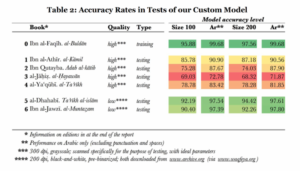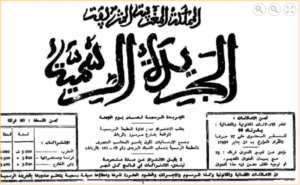
 DEVELOPMENTS IN DIGITAL ISLAMIC LAW :: New Tools that Range from Machine Learning to Mapping Islamic Legal Texts Preceding the annual Middle East Studies Association (MESA) conference in Boston, SHARIAsource hosted several events on emerging digital research tools featuring new research tools developed by Maxim Romanov (Universität Leipzig) and his team. The events covered digital mapping tools that can – among other historical questions – show the regions in which different approaches to Islamic law developed and spread, enable scholars to collaborate on creating a corpus of Arabic texts compatible with digital humanities tools, and allow comparisons between texts to show when and how much one scholar borrowed ideas from another. The major finding is this: after years of chasing a chimeric tool made up of the ability to manipulate Arabic PDFs (many of which are scans that remain static, like a physical book) and easy compatibility with machine learning and other digital humanities work (a tool long resolved for Latin characters), Romanov’s team has managed to capture the once mythical beast. For the first time in the field, the Islamicate Texts Initiative (ITI) has produced a high-accuracy optical character recognition (OCR) tool – with accuracy rates in the high-nineties – that will change the possibilities for digital Islamic law and digital Islamic humanities both. (The chart above illustrates the success rate for recognition when used on a number of different texts and scan qualities.) The ITI team, in addition to Romanov, includes Matthew Thomas Miller (Roshan Institute for Persian Studies, University of Maryland, College Park), Sarah Bowen Savant (Agha Khan University), and Benjamin Kiessling (Universität Leipzig). The events were sponsored or co-sponsored by the Islamic Legal Studies Program: SHARIAsource, the Center for Geographic Analysis at Harvard, and the Department of Near Eastern Languages and Civilizations (NELC). Read more. Image credit: ITI/Important New Developments in Arabographic Optical Character Recognition (OCR)
DEVELOPMENTS IN DIGITAL ISLAMIC LAW :: New Tools that Range from Machine Learning to Mapping Islamic Legal Texts Preceding the annual Middle East Studies Association (MESA) conference in Boston, SHARIAsource hosted several events on emerging digital research tools featuring new research tools developed by Maxim Romanov (Universität Leipzig) and his team. The events covered digital mapping tools that can – among other historical questions – show the regions in which different approaches to Islamic law developed and spread, enable scholars to collaborate on creating a corpus of Arabic texts compatible with digital humanities tools, and allow comparisons between texts to show when and how much one scholar borrowed ideas from another. The major finding is this: after years of chasing a chimeric tool made up of the ability to manipulate Arabic PDFs (many of which are scans that remain static, like a physical book) and easy compatibility with machine learning and other digital humanities work (a tool long resolved for Latin characters), Romanov’s team has managed to capture the once mythical beast. For the first time in the field, the Islamicate Texts Initiative (ITI) has produced a high-accuracy optical character recognition (OCR) tool – with accuracy rates in the high-nineties – that will change the possibilities for digital Islamic law and digital Islamic humanities both. (The chart above illustrates the success rate for recognition when used on a number of different texts and scan qualities.) The ITI team, in addition to Romanov, includes Matthew Thomas Miller (Roshan Institute for Persian Studies, University of Maryland, College Park), Sarah Bowen Savant (Agha Khan University), and Benjamin Kiessling (Universität Leipzig). The events were sponsored or co-sponsored by the Islamic Legal Studies Program: SHARIAsource, the Center for Geographic Analysis at Harvard, and the Department of Near Eastern Languages and Civilizations (NELC). Read more. Image credit: ITI/Important New Developments in Arabographic Optical Character Recognition (OCR)
 DOCUMENT: Sharifian Decree of 1957 – The Mudawwana: Law of Personal Status Uploaded by Morocco editor Ari Schriber, “This section of al-Jarīda al-Rasmiyya officially promulgates the first two books of the Moroccan Personal Status Code, the Mudawwana (1957). The first book presents stipulations concerning marriage, including issues such as the contract, dowry, and inhibitors (like number of wives). The second book deals with the dissolution of marriage, thus addressing conditions of repudiation, women’s repudiation, and the ʿidda (the woman’s waiting period until she may remarry).” Read more. Image credit: SHARIAsource
DOCUMENT: Sharifian Decree of 1957 – The Mudawwana: Law of Personal Status Uploaded by Morocco editor Ari Schriber, “This section of al-Jarīda al-Rasmiyya officially promulgates the first two books of the Moroccan Personal Status Code, the Mudawwana (1957). The first book presents stipulations concerning marriage, including issues such as the contract, dowry, and inhibitors (like number of wives). The second book deals with the dissolution of marriage, thus addressing conditions of repudiation, women’s repudiation, and the ʿidda (the woman’s waiting period until she may remarry).” Read more. Image credit: SHARIAsource
 SHARIAsource Welcomes New Program Coordinator Darrick Northington joined the SHARIAsource team last week as Program Coordinator. He brings amazing talents and experiences to the SHARIAsource’s team. Darrick is a graduate of Indiana University (BA) and Harvard University (MTS), where he studied religion and US society, American pragmatism, and the history of political philosophy. He spent the last several years closely assisting friend and mentor, Charles J. Ogletree Jr., Jesse Climenko Professor of Law at Harvard Law School. Most recently Darrick served as the House Administrator for The John Winthrop House. He brings many years of Harvard administrative experience to SHARIAsource, as well as a passion for academic study and racial and community justice. Image credit: Harvard
SHARIAsource Welcomes New Program Coordinator Darrick Northington joined the SHARIAsource team last week as Program Coordinator. He brings amazing talents and experiences to the SHARIAsource’s team. Darrick is a graduate of Indiana University (BA) and Harvard University (MTS), where he studied religion and US society, American pragmatism, and the history of political philosophy. He spent the last several years closely assisting friend and mentor, Charles J. Ogletree Jr., Jesse Climenko Professor of Law at Harvard Law School. Most recently Darrick served as the House Administrator for The John Winthrop House. He brings many years of Harvard administrative experience to SHARIAsource, as well as a passion for academic study and racial and community justice. Image credit: Harvard
See the full newsletter.

